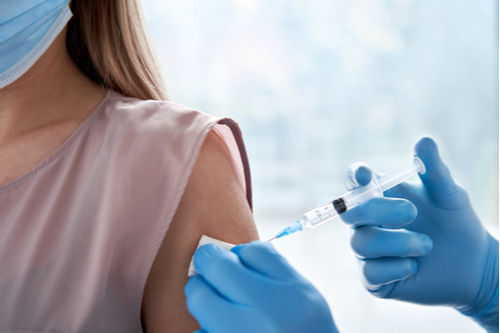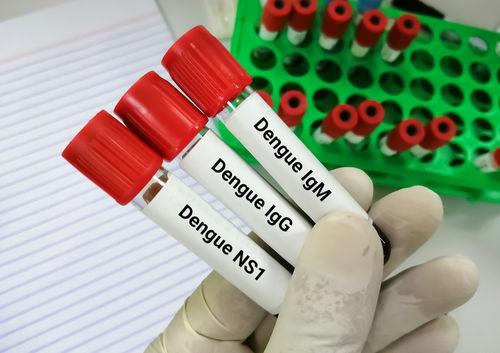- Home
- Blog
- Special Days
When To Get A Dengue Profile Test Done?
Special Days
When To Get A Dengue Profile Test Done?
By Apollo 24|7, Published on- 16 May 2022, Updated on -14 June 2023
Share this article
0
16 likes

In December 2021, a dengue outbreak was witnessed in different parts of India, which contributed to the majority of 1.6 lakh dengue cases reported in that year. While dengue is believed to thrive and peak just after the monsoon rains, the cases keep on emerging around the year. Every year May 16th is observed as National Dengue Day to spread awareness against dengue and its preventive methods. Let us understand more about the disease and its symptoms in this article.
What is dengue?
Dengue is a mosquito-borne illness that can be caused by one of the four dengue viruses (DENV 1, 2, 3 or 4) that belong to the family of flavivirus. When an uninfected female Aedes aegypti mosquito bites a person who has the dengue virus in their blood, it becomes infected. This mosquito can then transfer the virus to multiple people through repeated bites. You will be astonished to know that out of the four strains, DENV 2 (D2) can result in the most severe complications such as internal bleeding and shock.
What are the symptoms of dengue?
The symptoms of dengue may appear 3 to 10 days (incubation period) after being bitten by the virus-carrying mosquito. Its common symptoms include:
- High-grade fever
- Chills
- Severe headache
- Pain in the muscles and joints
- Pain behind the eyes
- Red coloured rashes spread over the chest and upper limbs
- Pain in stomach
- Loss of appetite
- A feeling of being sick
While for most people the symptoms resolve within 5 days, some people may develop severe infection resulting in life-threatening complications including dengue haemorrhagic fever and dengue shock syndrome. The symptoms of severe dengue that require immediate medical attention include:
- Persistent nausea and vomiting
- Blood in vomit
- Severe pain in the abdomen
- Excessive fatigue
- Bleeding from gums
- Rapid breathing
- A sudden drop in blood pressure
- Seizures (fits)
The presence of these symptoms alone does not confirm the diagnosis of dengue. The doctor usually recommends a dengue profile test to confirm the infection.
What is a dengue profile test and when should it be done?
It is extremely important to detect dengue at an early stage to prevent severe, potentially fatal complications. Dengue profile is a blood test that is used to determine the presence of dengue NS1 antigen, and IgM and IgG antibodies, which are released in the body after a person gets bitten by an infection-carrying mosquito. The interpretation of the reports is based on the following information.
- NS1 antigen is a type of protein that is found in the blood of infected patients from the 1st to 5th day after the fever begins. While a positive report for NS1 antigen indicates dengue infection, those who test negative are recommended an IgG and IgM antibody test to confirm possible dengue exposure.
- IgM and IgG antibodies are formed by the immune system of the body to fight infection. They usually develop after a week of infection.
- An infected person may test positive for IgM antibodies 4 to 5 days after the beginning of symptoms.
- The presence of IgM and IgG antibodies indicates a recent dengue infection. However, if the levels of IgG are higher than IgM, it suggests that the person was infected with dengue in the past.
How can we prevent dengue?
Here are some steps we can take to prevent dengue fever.
- Use mosquito repellents: One should use repellents containing 50% DEET (combination of chemicals), picaridin, and para-menthane-diol, as they are effective against mosquitos and other insects. Do not apply the repellent close to eyes, mouth or over irritated skin.
- Keep the body covered: Wear fully covered, loose clothes such as long pants, full-sleeved shirts, socks and shoes as they make it difficult for the mosquito to bite through the clothes. One can also use a mosquito net treated with insecticide while sleeping.
- Keep your surroundings clean: Mosquitoes can breed in still water, therefore, empty and dry the containers such as coolers, planters, garbage containers, and buckets, especially during the rainy season.

Recommended read: How To Prevent The Deadly Dengue Fever
Vaccine against dengue virus
‘Dengvaxia’, the only vaccine available for the dengue virus formulated by a French pharmaceutical company, Sanofi Pasteur, was approved by the U.S. Food and Drug Administration in 2015 to be used for people aged 9 to 45 years. However, the World Health Organization (WHO) recommended that the vaccine should only be given to people who were previously infected with the dengue virus. It was found that the administration of the vaccine in people who have not had dengue before, could increase the risk of hospitalization and severe dengue if they get their first natural dengue infection after the vaccination.
Meanwhile, several other countries have been working on developing a vaccine against the dengue virus. Scientists from the National Centre for Biological Sciences (NCBS), Bengaluru, have also developed a DNA vaccine against dengue infection, which targets the viral protein called EDIII, present in all four serotypes of the dengue virus. This vaccine is still under research and specifically targets the NS1 antigen of the D2 type of dengue virus.

Most dengue infections are self-resolving, however, if left unchecked and untreated, they can develop into severe life-threatening complications. One should keep their surroundings clean, avoid stagnation of water, disinfect standing water, keep themselves covered, and use mosquito repellents to reduce their risk of dengue infection. Those who experience symptoms of dengue must consult a general physician for further investigation.
To confirm your diagnosis, Book Apollo's Dengue Profile Test
Medically reviewed by Dr Sonia Bhatt
Services
Special Days
Leave Comment
Services
Recommended for you

Special Days
World Autism Awareness Day: All You Need To Know About This Disorder
Autism is a developmental disorder that can affect a child's ability to learn, communicate, and understand. However, therapy and medication can help manage the symptoms effectively.

Special Days
World Health Day 2022: Let’s Ensure Good Health For All
Climate change can affect human health adversely. Here's how one can fix their surrounding environment to promote overall well being.

Special Days
World Salt Awareness Week: What Happens When You Eat Too Much Salt?
While salt plays an essential role in maintaining water balance in the body, too much intake can result in severe health consequences.
Subscribe
Sign up for our free Health Library Daily Newsletter
Get doctor-approved health tips, news, and more.


